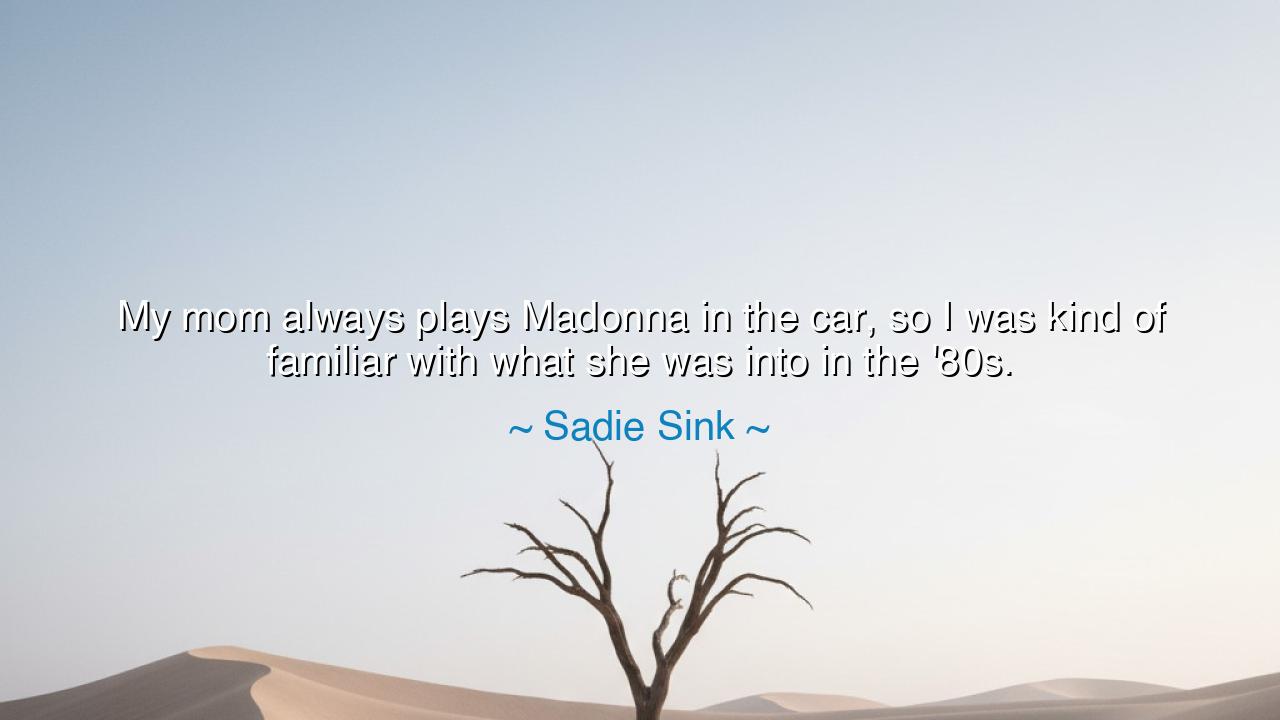
My mom always plays Madonna in the car, so I was kind of familiar
My mom always plays Madonna in the car, so I was kind of familiar with what she was into in the '80s.






The young artist Sadie Sink, whose presence on screen carries both grace and intensity, once said: “My mom always plays Madonna in the car, so I was kind of familiar with what she was into in the '80s.” At first glance, these words appear lighthearted, a simple remembrance of childhood and pop music. Yet beneath their simplicity lies a deeper truth about inheritance, connection, and the subtle ways that generations pass down their spirit to one another—not through sermons or lessons, but through the songs they love, the memories they share, and the rhythms that fill the air around them.
The origin of this quote lies not merely in a family car ride, but in a moment of generational continuity. A mother, shaped by the fire and freedom of the 1980s, plays the music that once defined her youth—Madonna, a symbol of rebellion, reinvention, and feminine power. In that car, the daughter listens, half-aware, half-dreaming, absorbing not only melodies but the essence of an era. For music, unlike words, moves through the unseen corridors of the heart. It carries with it the laughter of the past, the dreams of the young, and the pulse of all that was once daring and alive. Through her mother’s music, Sadie did not just learn about the ’80s; she inherited a piece of her mother’s soul.
This act—of sharing the past through music—is as ancient as humanity itself. The Greeks passed down the stories of their heroes through song; the tribes of Africa told their histories in rhythm and drum. The ancients knew what we are only now remembering: that culture is not taught—it is felt, carried on breath, on sound, on the subtle beauty of repetition. When Sadie’s mother pressed play on a Madonna song, she was not simply reliving her youth; she was inviting her daughter into it. And in that shared soundscape, two generations met—one recalling who she was, the other beginning to understand who she might become.
In this way, the car becomes a temple of inheritance—a sacred space where time folds and memories echo. The mother’s music becomes a bridge between decades, teaching her child not through instruction but through immersion. The Madonna of the ’80s, with her fearless individuality and unapologetic expression, becomes a kind of ancestor-spirit, whispering lessons about confidence, rebellion, and selfhood. The daughter may not yet grasp all that this means, but one day, she will feel it within herself—the same courage that once moved through her mother’s veins.
We see this pattern woven throughout history. Consider Beethoven, who as a boy listened to his father’s passionate playing of Mozart’s works. Though his father was harsh, the music itself became a seed that would later bloom into greatness. Or think of the folk songs carried by immigrant families across oceans—melodies that held their old lands within them and taught their children where they came from. These songs were not just entertainment; they were identity, belonging, and love disguised as sound. In the same way, when a mother plays her music for her child, she is performing an ancient ritual—passing down emotion through vibration, memory through melody.
The lesson in Sadie Sink’s reflection is gentle yet profound: do not underestimate the power of the small moments. A song in the car, a story told at dinner, a film shared between generations—these are not trivial things. They are the quiet roots of continuity, the invisible threads that tie the past to the present. To the young, they may seem like background noise, but one day, they will echo in memory and shape who they become. And to the elders, they are a way of living beyond their own years, of ensuring that what they loved does not die, but transforms.
So, dear listener, when you find yourself sharing your own joys—whether through music, art, or words—do so with awareness. You are not merely reminiscing; you are transmitting legacy. And when you find yourself on the receiving end—hearing your parent’s favorite song, or watching the film they adored—pause and listen deeply. For within those rhythms and images lives their story, their youth, their heart.
Thus, Sadie Sink’s simple recollection becomes a timeless truth: that love often speaks not through lectures, but through art—through songs that outlive their singers, through echoes of joy that travel across generations. Cherish these echoes. For in every melody passed from one heart to another, time itself is conquered, and we remember that what we inherit is not only blood, but the beauty of the worlds our parents once loved.






AAdministratorAdministrator
Welcome, honored guests. Please leave a comment, we will respond soon